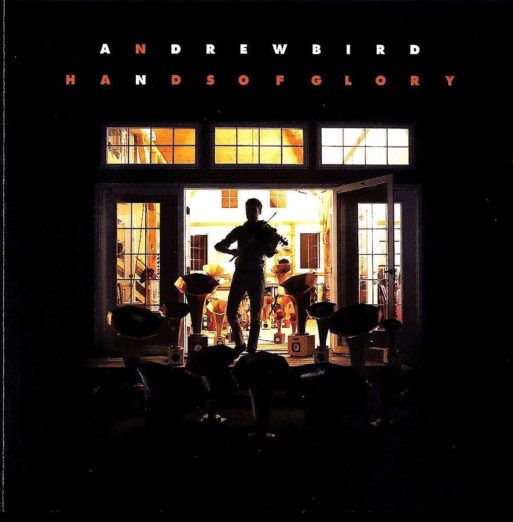 Andrew Bird’s “Orpheo” looks at untimely loss and the power of music through a famous Greek myth. Orpheus was the master musician among all men; he could influence trees, stones and streams. No one could resist his lyre and voice, not even the gods. However, even with such musical prowess, the musician could not overcome the vicissitudes of fate. He married his beloved maiden, Eurydice, but their love was brief: after the marriage ceremony, a viper bit and killed his bride. Stricken with uncontrollable grief, the artist embarked on a journey to the underworld to bring her back. When he found Pluto, the god of the underworld, he played a song of grief so moving that the callous god shed tears and assented to the musician’s request. Eurydice could go back to life—but on one condition: she would follow him out of the cave and he could not look at her until they were back on earth. Just as he approached the light at the entrance, Orpheus, suddenly overcome with excitement, looked back, and Eurydice disappeared forever.
Andrew Bird’s “Orpheo” looks at untimely loss and the power of music through a famous Greek myth. Orpheus was the master musician among all men; he could influence trees, stones and streams. No one could resist his lyre and voice, not even the gods. However, even with such musical prowess, the musician could not overcome the vicissitudes of fate. He married his beloved maiden, Eurydice, but their love was brief: after the marriage ceremony, a viper bit and killed his bride. Stricken with uncontrollable grief, the artist embarked on a journey to the underworld to bring her back. When he found Pluto, the god of the underworld, he played a song of grief so moving that the callous god shed tears and assented to the musician’s request. Eurydice could go back to life—but on one condition: she would follow him out of the cave and he could not look at her until they were back on earth. Just as he approached the light at the entrance, Orpheus, suddenly overcome with excitement, looked back, and Eurydice disappeared forever.
“Orpheo” focuses on this single, unfortunate action of looking back. As an allegory for memory and recalling a lost loved one, this tendency of ours to feel their presence—to believe, somehow, that he or she will walk through the door again—gives the myth a personal edge. Andrew bird narrates the basic journey, the desire to turn the “hollow words” into reality, or the lyrics about Eurydice into the actual woman:
There are places we must go to
To bring these hollow words on back from
You must cross the muddy river
Where love turns to fear
Then, the chorus descends. The singer repeatedly reminds himself of Orpheus’s dire mistake. The music fails: it cannot replace what is lost. although the singer is aware of this truth, he nevertheless desires to look back and prove with his eyes the absent presence in the room:
They say you don’t look
There’s only one way
On back from on back from here
They say you don’t look
They say you don’t look
‘Cause it’ll disappear
As long as we don’t look, our loved one is there. The opposition between seeing and believing describes the tension between a material loss maintained through immaterial recollection. We can’t see what we are looking for, but we can’t resist the temptation to look anyway:
And our eyes, they keep on strainin’
As if to see what lies behind them
Through the shells of empty buildings
And great columns of glass
The song suggests that we Don’t look for proof. Orpheus lost Eurydice because he wanted visual verification of his bride. Such a need for knowledge of her presence only ruins her presence, because it is impossible. This truth is maddening. But we get used to it, we get used to the absence, and Andrew Bird, though ambivalent, reminds us that the worst of grief will (probably) pass.
They say you don’t look
They say you don’t look
‘Cause it’ll drive you mad
And if it drives you mad
If it drives you mad
It’ll probably pass
More from A Right of Passage:
- Memorial Music: “Dreams Old Men Dream” by the Cold War Kids
- Memorial Songs: “Casimir Pulaski Day” by Sufjan Stevens
- Memorial Music: “Will You Miss Me when I’m Gone?” by The Carter Family

 “Orpheo” by Andrew Bird
“Orpheo” by Andrew Bird



 The Other Death in the Family
The Other Death in the Family

 The Healing Sound of Singing Bowls
The Healing Sound of Singing Bowls














